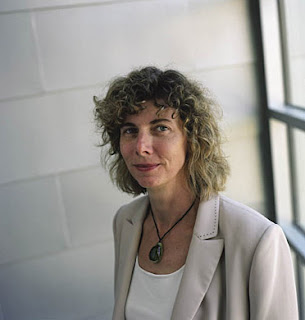 |
| Dr. MacFarlane (Image: George Mason University) |
Given that MacFarlane's hearing before the Senate Environment and Public Works committee is scheduled for tomorrow, here are some questions which I believe would better inform the discussion both of whether MacFarlane is a good candidate to lead the NRC and what her leadership might entail.
NRC & Leadership
- Given the size and relative impact of the NRC, it is not an agency known for its amenability to on-the-job leadership training. A particular concern is in your lack of organizational leadership experience on your resume. Why do you believe you are qualified to lead the NRC, and what leadership qualities do you believe you bring to the table?
- Describe what you feel are the key challenges currently facing the NRC. What areas would you focus on as chair, and how would you work to overcome them?
- Your attitudes appear to have evolved from being a self-described "nuclear agnostic" to indicating that "we absolutely need" nuclear energy with respect to climate change. What provoked this evolution?
- A prominent concern regarding your appointment to the chairmanship of the NRC is that your background has generally not focused on nuclear fuel cycle technology per se. How do you believe you can overcome this experience gap?
- Much of the NRC's policy comes down to producing an appropriate balance of safety with economic considerations in regulation. Please describe your thinking on what constitutes socially acceptable risks. Should the safety threshold for nuclear energy systems be higher than other commonly accepted risks, such as air travel? What about in comparison to other energy sources?
- A decision which has been roundly criticized by many nuclear experts was outgoing Chairman Jazcko's unilateral decision to establish a 50-mile evacuation zone for U.S. residents in Japan, contrary to both existing U.S. evacuation guidelines and the Japanese evacuation guidelines. Do you agree with this decision? If so, upon what basis? If not, where did the Chairman err and how would you handle the situation differently?
Nuclear Waste Management
- As an outspoken critic of Yucca Mountain, both on technical and procedural grounds, how do you view the decision by your predecessor Gregory Jazcko, along with President Obama and Secretary Chu to terminate the licensing review process in light of amendments to the 1982 Nuclear Waste Policy Act which legally mandate Yucca Mountain as the nation's sole geologic repository? Would you allow the licensing process to move forward? If not, how then do you square this under existing federal law?
- One of your significant contributions to the Blue Ribbon Commission was a strong focus upon a more consent-based process of involving communities in the repository licesing process. What do you view as the NRC's role the siting process for a potential repository (if any)?
- What immediate actions (if any) do you believe the federal government should take with respect to spent fuel management?
Nonproliferation
- Your academic background includes several publications on the topic of nuclear nonproliferation policy. In particular, you have publicly stated your opposition to spent fuel reprocessing on nonproliferation grounds. Do you believe President Carter's decision to suspend civil reprocessing in the United States was ultimately effective in achieving its stated nonproliferation goals?
- How do these nonproliferation concerns relate to the NRC's recent license to GE to construct a laser enrichment test facility, given similar nonproliferation concerns?
- Please describe why you believe reprocessing of reactor-grade plutonium to be a viable proliferation concern, particularly in nuclear weapons states.
- What role (if any) do you see for the NRC in establishing U.S. nonproliferation policy?
Licensing and new construction
- A particular challenge to the development of novel reactor concepts such as small modular reactors as well as entirely new reactor concepts such as TerraPower's traveling wave reactor has been the difficulty in getting such designs through the NRC licesning process. In particular, this has been described as a "chicken-and-egg" problem, with the NRC refusing to prioritize designs with no present commercial interest, while utilities are generally only interested in designs that are expected to receive NRC review. As a result, some designers - such as TerraPower - plan on circumventing the U.S. market entirely. What do you believe the NRC should do to address this issue?
- Nuclear experts such as Rod Adams have pointed out that the existing COL process relies on the assumption that no amendments to the design will need to be made after construction begins. Does this process need to be improved? If so, how would you propose improving it?
- Departing chairman Jazcko was frequently the lone dissenter on several recent votes for involving reactor licensing and construction, including the construction licenses for Vogtle and VC Sumner reactors as well as the recent 20-year license extension for the Pilgrim nuclear facility. Do you believe Jazcko's dissenting votes were justified? If so, on what grounds? If not, how would you approach the situation differently?
What questions would you ask MacFarlane, given the chance?
Update: Margaret Harding presents her own list of questions, and Rod Adams posts a transcript of his 2007 interview with Dr. MacFarlane in which she declares herself as an "atomic agnostic."
Update II: Jack Spencer at Heritage's blog similarly poses his questions. Some substantial overlap in themes arises - particularly over issues such as Yucca Mountain and new reactor licensing.
Update: Margaret Harding presents her own list of questions, and Rod Adams posts a transcript of his 2007 interview with Dr. MacFarlane in which she declares herself as an "atomic agnostic."
Update II: Jack Spencer at Heritage's blog similarly poses his questions. Some substantial overlap in themes arises - particularly over issues such as Yucca Mountain and new reactor licensing.
No comments:
Post a Comment